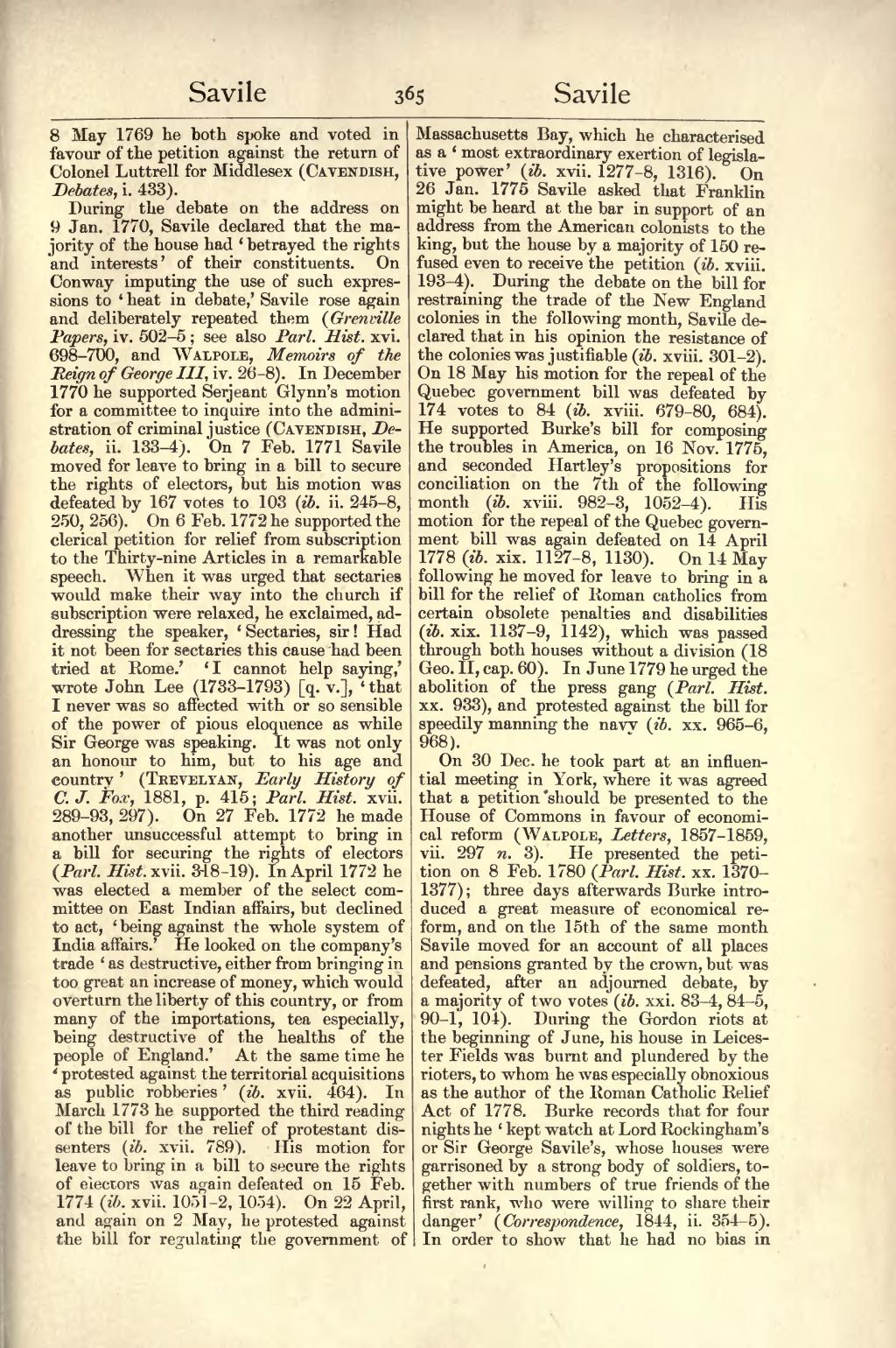8 May 1769 he both spoke and voted in favour of the petition against the return of Colonel Luttrell for Middlesex (Cavendish, Debates, i. 433).
During the debate on the address on 9 Jan. 1770, Savile declared that the majority of the house had ‘betrayed the rights and interests’ of their constituents. On Conway imputing the use of such expressions to ‘heat in debate,’ Savile rose again and deliberately repeated them (Grenville Papers, iv. 502–5; see also Parl. Hist. xvi. 698–700, and Walpole, Memoirs of the Reign of George III, iv. 26–8). In December 1770 he supported Serjeant Glynn's motion for a committee to inquire into the administration of criminal justice (Cavendish, Debates, ii. 133–4). On 7 Feb. 1771 Savile moved for leave to bring in a bill to secure the rights of electors, but his motion was defeated by 167 votes to 103 (ib. ii. 245–8, 250, 256). On 6 Feb. 1772 he supported the clerical petition for relief from subscription to the Thirty-nine Articles in a remarkable speech. When it was urged that sectaries would make their way into the church if subscription were relaxed, he exclaimed, addressing the speaker, ‘Sectaries, sir! Had it not been for sectaries this cause had been tried at Rome.’ ‘I cannot help saying,’ wrote John Lee (1733–1793) [q. v.], ‘that I never was so affected with or so sensible of the power of pious eloquence as while Sir George was speaking. It was not only an honour to him, but to his age and country’ (Trevelyan, Early History of C. J. Fox, 1881, p. 415; Parl. Hist. xvii. 289–93, 297). On 27 Feb. 1772 he made another unsuccessful attempt to bring in a bill for securing the rights of electors (Parl. Hist. xvii. 318–19). In April 1772 he was elected a member of the select committee on East Indian affairs, but declined to act, ‘being against the whole system of India affairs.’ He looked on the company's trade ‘as destructive, either from bringing in too great an increase of money, which would overturn the liberty of this country, or from many of the importations, tea especially, being destructive of the healths of the people of England.’ At the same time he ‘protested against the territorial acquisitions as public robberies’ (ib. xvii. 464). In March 1773 he supported the third reading of the bill for the relief of protestant dissenters (ib. xvii. 789). His motion for leave to bring in a bill to secure the rights of electors was again defeated on 15 Feb. 1774 (ib. xvii. 1051–2, 1054). On 22 April, and again on 2 May, he protested against the bill for regulating the government of Massachusetts Bay, which he characterised as a ‘most extraordinary exertion of legislative power’ (ib. xvii. 1277–8, 1316). On 26 Jan. 1775 Savile asked that Franklin might be heard at the bar in support of an address from the American colonists to the king, but the house by a majority of 150 refused even to receive the petition (ib. xviii. 193–4). During the debate on the bill for restraining the trade of the New England colonies in the following month, Savile declared that in his opinion the resistance of the colonies was justifiable (ib. xviii. 301–2). On 18 May his motion for the repeal of the Quebec government bill was defeated by 174 votes to 84 (ib. xviii. 679–80, 684). He supported Burke's bill for composing the troubles in America, on 16 Nov. 1775, and seconded Hartley's propositions for conciliation on the 7th of the following month (ib. xviii. 982–3, 1052–4). His motion for the repeal of the Quebec government bill was again defeated on 14 April 1778 (ib. xix. 1127–8, 1130). On 14 May following he moved for leave to bring in a bill for the relief of Roman catholics from certain obsolete penalties and disabilities (ib. xix. 1137–9, 1142), which was passed through both houses without a division (18 Geo. II, cap. 60). In June 1779 he urged the abolition of the press gang (Parl. Hist. xx. 933), and protested against the bill for speedily manning the navy (ib. xx. 965–6, 968).
On 30 Dec. he took part at an influential meeting in York, where it was agreed that a petition should be presented to the House of Commons in favour of economical reform (Walpole, Letters, 1857–1859, vii. 297 n. 3). He presented the petition on 8 Feb. 1780 (Parl. Hist. xx. 1370–1377); three days afterwards Burke introduced a great measure of economical reform, and on the 15th of the same month Savile moved for an account of all places and pensions granted by the crown, but was defeated, after an adjourned debate, by a majority of two votes (ib. xxi. 83–4, 84–5, 90–1, 104). During the Gordon riots at the beginning of June, his house in Leicester Fields was burnt and plundered by the rioters, to whom he was especially obnoxious as the author of the Roman Catholic Relief Act of 1778. Burke records that for four nights he ‘kept watch at Lord Rockingham's or Sir George Savile's, whose houses were garrisoned by a strong body of soldiers, together with numbers of true friends of the first rank, who were willing to share their danger’ (Correspondence, 1844, ii. 354–5). In order to show that he had no bias in
